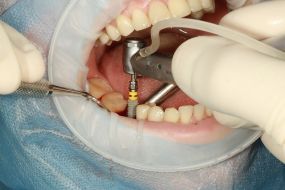Dental Implants – What Determines Success and Failure

Dental implants have been around since 1950 and have transformed the way dentists deal with a missing tooth. The procedure is immensely popular due to its high success rate. When compared to other teeth replacement methods, like dentures or bridges, dental implants provide a permanent and convenient solution.
Dental Implants, McLean offers numerous benefits for patients. However, their advantages depend on the successful execution of dental implants.
Dental implants have a high success rate of 94 -98 percent. Hence, the process can fail to create the desired results for a few patients.
The success and failure of a dental implant depend on various factors. Let us discuss them in detail.
1. Bone mass
The health and thickness of your jaw bone have a significant impact on the success and failure of an implant. An implant is surgically screwed into the bone. Hence, only a healthy jaw can receive dental implants.
After you lose your teeth, the bone slowly starts losing the bone mass. Hence, it is advisable to get your implants as soon as possible, after tooth loss.
A dentist will assess your jaw bone to ensure that it can provide a strong base for the implant. Patients with low bone mass can receive implants with the help of a supplemental procedure called a bone graft.
Bone grafting is a procedure that adds bone material to an area of low bone mass to stimulate bone growth. Hence, it strengthens your jaw for treatments like a dental implant.
2. Oral hygiene
Poor dental hygiene is one of the significant reasons for implant failure. Good oral hygiene for your natural teeth requires flossing and mouthwash, along with brushing your teeth twice a day.
This is also necessary in the case of dental implants. Good oral hygiene will help in eliminating plaque and lodged food from the implant site, which could result in the growth of bacteria.
Bacterial overgrowth in your mouth can lead to infection and interfere with bone healing. Infections at the surgical site are painful and can increase the chances of implant failure.
3. Gum health
Gum health plays an essential role in determining the success and failure of your dental implants. If you have experienced any gum diseases in the past, it may increase your chances of developing peri-implantitis. It refers to gum diseases and infections around the implant that can cause implant failure.
Also, if you have a gum infection before the treatment, it is advisable to get it treated before starting the procedure at dental implants McLean.
4. Patients’ overall health
The general health of a patient also affects the results of an implant. Conditions like uncontrolled diabetes prevent faster healing of your body.
This can adversely impact your implant and the osseointegration. Other health concerns like Hyperparathyroidism, severe osteoporosis, and other diseases that cause bone resorption can deter the success of your implants.
Hence, it is advisable to disclose all your existing medical conditions to your dentist before the treatment. Also, if you have undergone radiation therapy of jaw and bone, you need to consult your dentist beforehand. Your dentist will find suitable solutions to work around these problems.
5. Dentist skill and experience
The implant is an advanced dental procedure, and it is crucial to choose a skilled and experienced dentist. Your dentist makes some essential choices during the implant procedure, like the design of the crown, type of abutment, the judgment of bone, etc.
A competent dentist can avoid surgical faults like nerve damage, faster drill speed, insufficient irrigation to the surgical site, wrong direction of implant placement. Hence to ensure a successful implant, you must visit a competent dental implant, McLean.
6. Patient lifestyle and habits
The success or failure of an implant depends on the habits of the patient. For example, excessive smoking and drinking can cause implant failure.
To ensure the success of your dental implant, you need to follow all the instructions from your dentist. This includes practicing good oral hygiene and avoiding hard food items that can cause strain on your dental implant.
These are some of the factors that determine success and failure in the case of dental implants.
